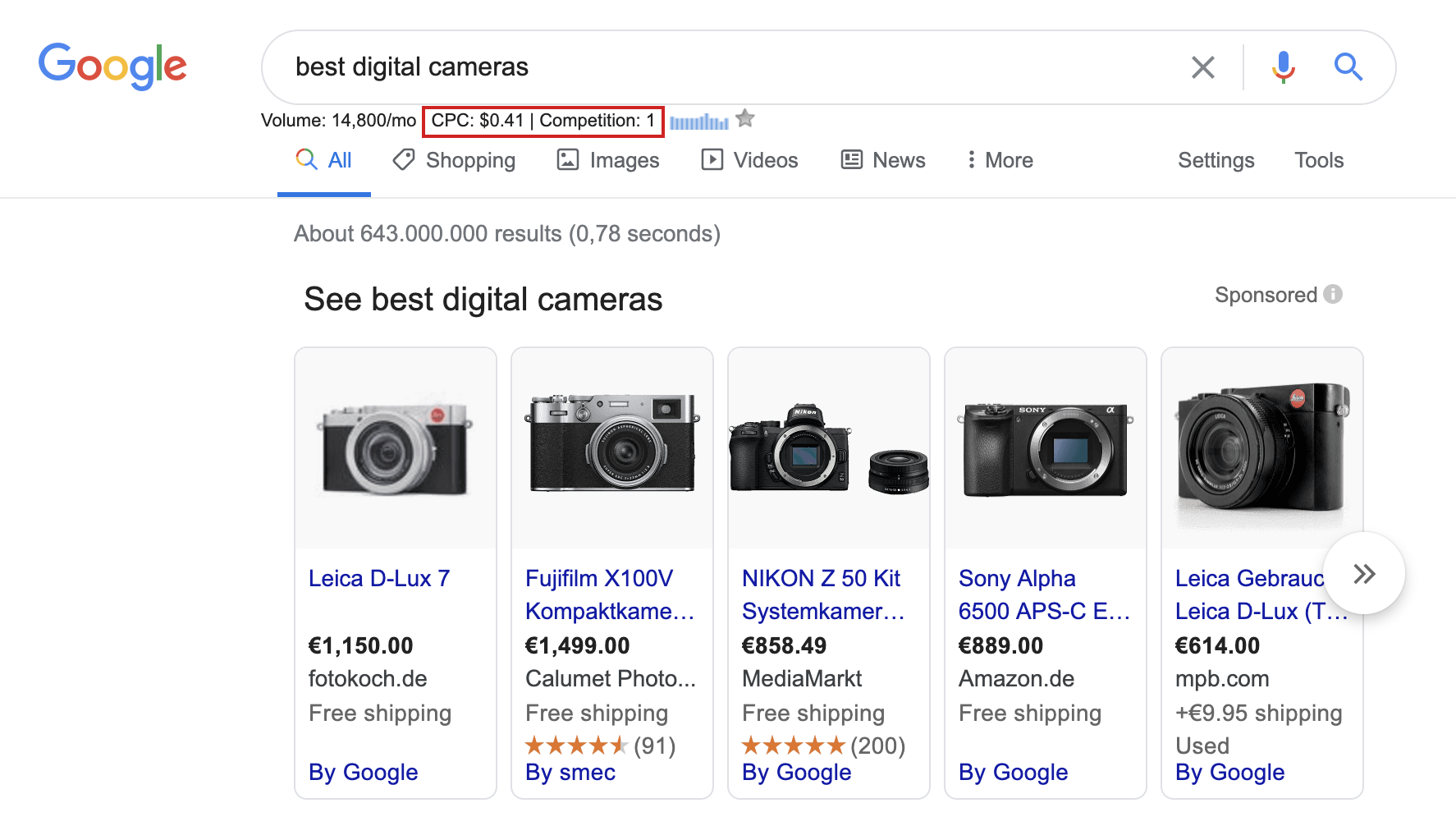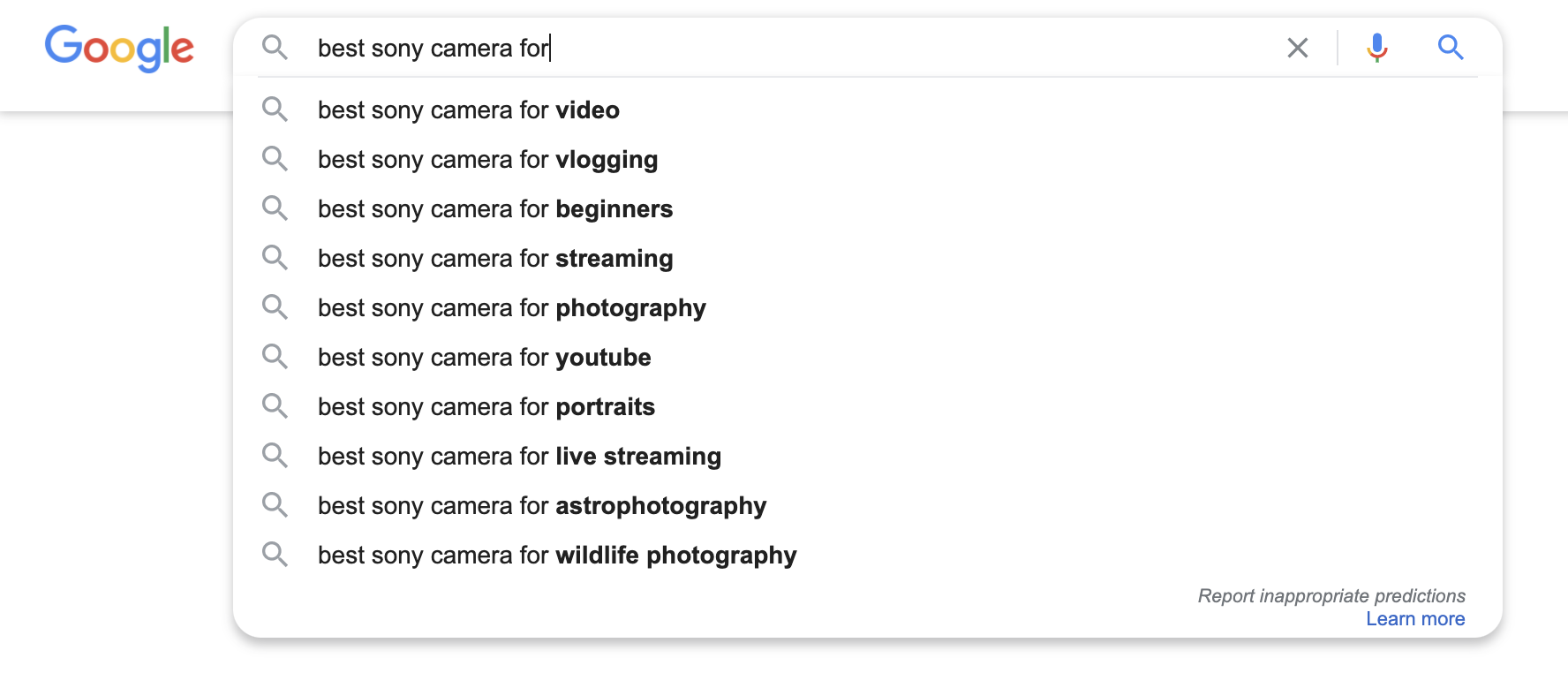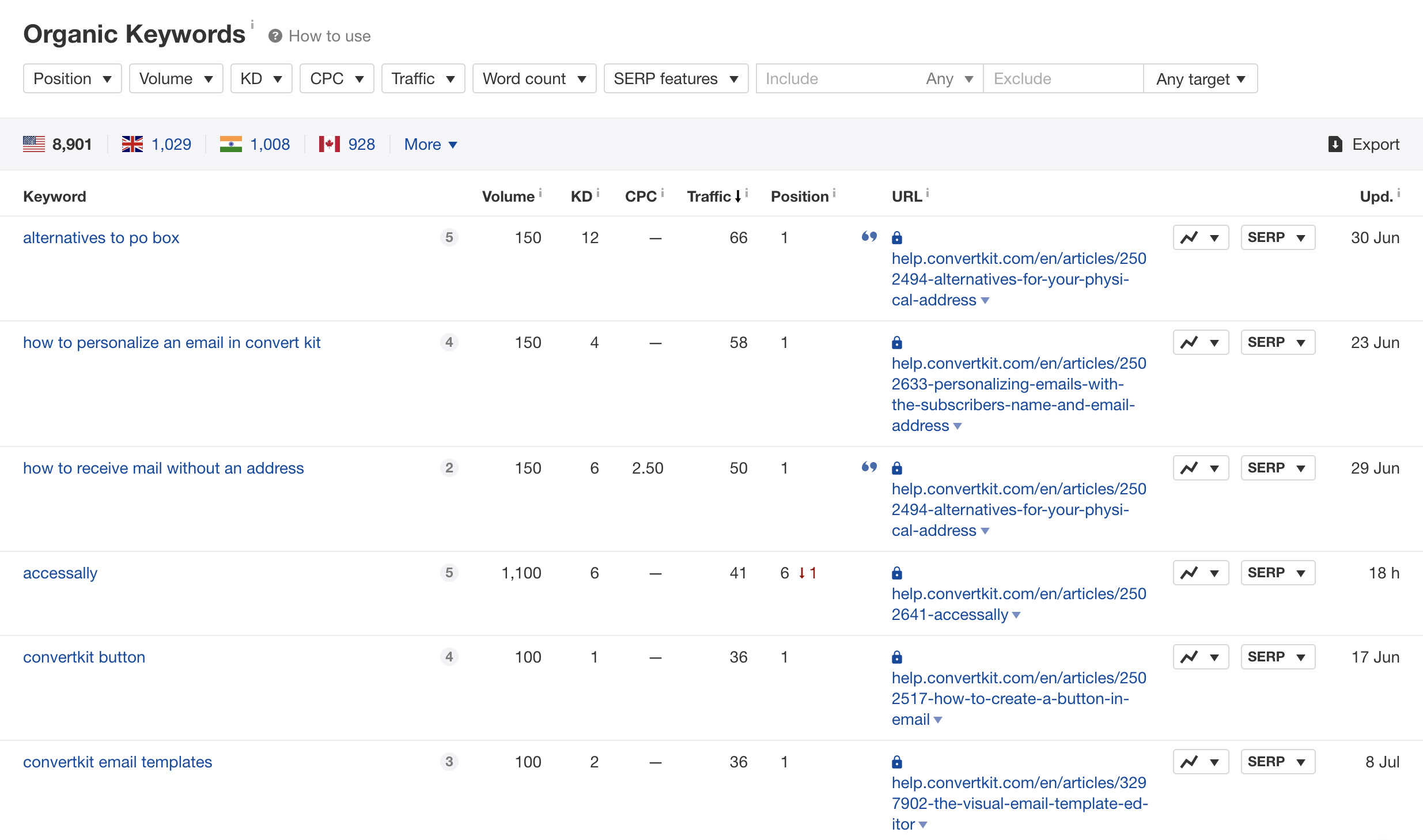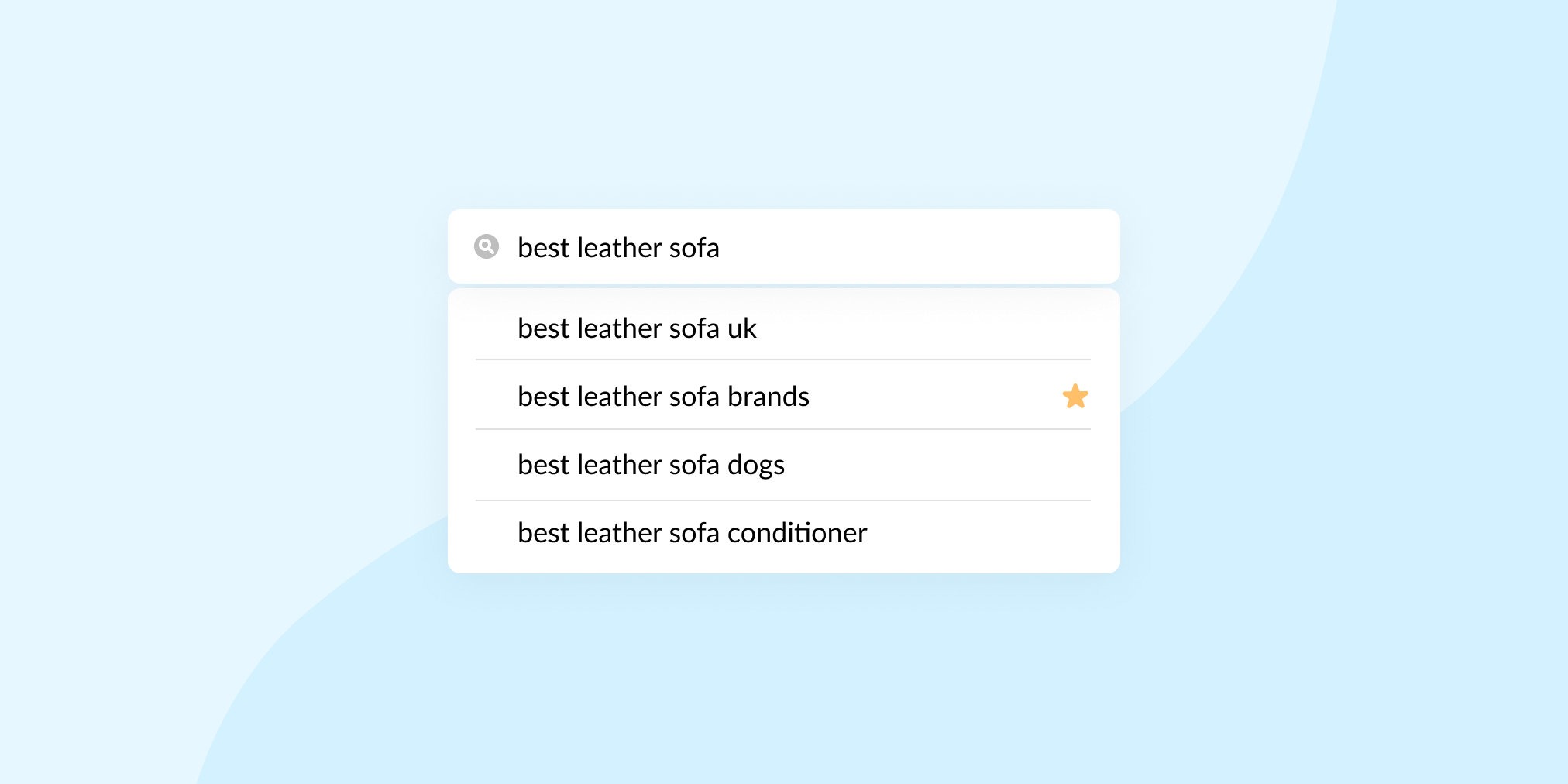How to Find Buyer Intent Keywords for Affiliate Marketing
Ranking even a small website for the right keywords can bring in thousands of dollars per month in revenue.
That's true no matter if you're an affiliate, an ecommerce retailer, or even a SaaS company like us.
But it's not as simple as going after the biggest and most profitable search terms. Often times, the competition is so entrenched you'll need an outright media empire (and a lot of capital) to break through.
Want to learn how to get ahead while running a lean operation, and find low-competition affiliate keywords with strong buying intent and predictable traffic? Read on to learn:
- What are buyer intent keywords?
- How to find out if a keyword has buyer intent
- List of buyer intent keywords
- How to find affiliate keywords with less competition
What are buyer intent keywords?
Buyer intent keywords are search queries that indicate someone is planning to make a purchase. By targeting buyer intent keywords, you can write content that catches people at a key point in their decision-making process.
Buyer intent keywords are often targeted by affiliate marketers, because people using these types of search terms are often just a few clicks away from completing an online purchase.
That's where your compelling copy, unique imagery, and effective calls-to-action come in.
But it all starts with targeting the right keywords.
How to find out if a keyword has buyer intent
One popular way to see this in action is looking at the CPC (cost-per-click) for an ad targeting a specific keyword. Clearly, people looking to sell things with ads tend to target these terms as well because it results in a positive ROI (return on investment).
If you use a tool like Keywords Everywhere, it's really easy to see the CPC whenever you Google something.

However, as you'll see in this article, you can get an excellent ROI by thinking outside the box and targeting keywords that no one is bidding on.
List of buyer intent keywords
You might've heard about broad classifications of keyword intent like "informational keywords", "navigational keywords", and "transactional keywords".
While these categorizations are definitely interesting, I'm going to go a bit more granular to try and break down some affiliate keyword formulas.
We're going to start at the beginning of the so-called consumer buying cycle, and work our way towards the end.
- Info Keywords
- Comparison Keywords
- Product Keywords
- Bargain-hunting Keywords
Info keywords (X, brand name Y, how to X, best way to Y)
A lot of times affiliates will avoid going for info keywords because they're too distanced from that buying decision.
But there are some great opportunities for targeting info keywords if there is a product that solves or radically simplifies the solution to a problem a searcher has.
- How to X — e.g. "How to remove wine from a tablecloth" (buy stain remover), "How to watch HBO Go in Germany" (get a VPN), "How to improve my French" (take a language course).
- Best way to X — e.g. "Best way to reach Berlin from Hamburg" (train tickets or a day tour), "Best way to make coffee" (buy an aeropress)
A lot of times it can be easiest to start with the product in mind and work your way back to the problems it solves instead.
Comparison keywords (X vs Y, best X)
Comparison keywords signal that a person is looking to buy something but needs help narrowing their decision. Here are a few formulas for comparison keywords:
- X vs. Y — e.g. "sony a7 vs a7ii" (buy a sony camera), "nintendo switch vs PS4" (buy a gaming console)
- Best X — e.g. "best digital cameras" (buy a camera), "best villages in tuscany" (book accommodation)
- X or Y — e.g. "kitchenaid or oyster blender" (pick a blender brand), "florence or rome" (book transportation or accommodation)
- X pros and cons — e.g. "nintendo switch pros and cons" (buy a switch or an alternative)
- X alternatives — e.g. "gopro alternatives" (buy a cheaper action cam)
The important thing to remember is that sometimes search volume will lie to you, because there are so many possible combination people can type in. It can also happen that newly released products aren't "on the radar" yet.
So don't be too discouraged if you see a really low search volume on these kind of keywords, because the high buying intent can sometimes compensate for that.
Product keywords (X, X reviews, X accessories)
People search for these terms when they're somewhat narrowed in on a specific product. Maybe they've already considered alternatives, and want to go deeper into a specific option.
- X review — e.g. "nintendo switch review"
- X accessories — e.g. "gopro accessories", "nintendo switch accessories"
If you're not sure how to start, you can try our product review template for how these posts should be structured to improve conversion.
Bargin-hunting keywords (cheap X, affordable X, X on a budget, free X)
You can think of this as an extension of "comparison" keywords.
Everyone loves a good deal, even people with a bunch of money. So don't be shy about targeting keywords that tailor to budget-conscious people.
Instead, I'd be mindful of the age of the person you're targeting, as younger people tend to have less money and be more price sensitive than people who're more financially established.
Just keep in mind, "Who's typically buying this?" when you target a keyword like this.
- Best X under Y — e.g. "best coffee machines under 100")
- Do X on a budget — e.g. "barcelona on a budget", "budget accommodation in barcelona")
- X deals — e.g. "panasonic tv deals", "black friday deals", etc.)
- Affordable X — "affordable villa in maldives" (it's the dream, right?)
- Coupon for X, Voucher for X, X discount code — Now you know why there are so many coupon websites that don't really work 🤣
You can also have the exact opposite where people search for terms like "luxury X".
How to find affiliate keywords with less competition
So a lot of these examples are great if you're specifically looking to promote physical products on Amazon or at another retailer.
They tend to have a lot of search volume, but you're often competing with ultra savvy people to rank.
Instead, we can look at the long tail for our commercial intent keywords.
If you can be smarter than your average bear and think one level removed from the buying cycle, you can find keywords with amazing buyer intent and low competition.
Here are some tactics for finding profitable buyer intent keywords you can rank for without selling your organs for baclinks:
1. Easy mode: Research competitors in your niche
Chances are you know of sites in your niche that you suspect are making a killing, which you discovered during your niche research.
At this point, you can use a keyword research tool like Ahrefs to scout out the pages on their website that likely receive the most traffic.
Just be aware that it is a guess, and there's a good chance that high buying intent and low search volume terms won't show up at the top. But you can filter your competitor's website's keywords using those buying intent signals.
Here's a way to do it without a fancy tool. Just type this in Google:
site:yourcompetitor.com "best"
Or replace "best" with some of the other popular affiliate keywords we've talked about, like "worth it", "vs", "budget", "cheap", "review", etc.
In case those terms also appear in the URL, you can use a query like this:
site:yourcompetitor.com inurl:best
Here's a great list of Google search operators for anyone who wants to feel like a hacker when searching the web.
Sadly Google discontinued the title operator, which would make this even more powerful.
Another way of doing this is by checking out your competitor's sitemap. Just visit yourcompetitor.com/sitemap.xml and more likely than not, you'll find an index of their content where you can just Ctrl/Cmd + F and look for words like "best" and "vs" and so forth.
2. Niche down (Best X for Y)
Instead of targeting a competitive keyword like "Best X" (e.g. "best digital cameras") you can target something more niche, like "best digital cameras for video".
You can go even more niche by replacing something broad like "digital cameras" with a brand name, like "sony cameras". Then your keyword becomes something like "best sony camera for youtube" or "best sony camera for video".
How to apply this technique: The easiest way is literally using the Google's autocomplete.

You can also take just one of these, such as "best sony camera for video" and put it in a tool like Ubersuggest to quickly get an idea of related keywords and how difficult it might be to rank for them.
The good thing about this strategy is that you might end up ranking for "best sony camera" anyways.
3. Add the year to the search term (Best X in 2024)
This is an easy one and a way to capture people who are looking for the most up-to-date information. This especially works if your competitors have neglected to put the year in their article (or even haven't updated it this year).
You'll also know this is a common tactic to improve click-through rate in general, as it promises up-to-date information.
4. Solve a really niche problem
Think about a really specific group of people and how you can help them solve a problem.
For example, I'm an expat living in Germany, and I often have to deal with German bureaucracy and paperwork. If I write an article like "How to survive as an American in Berlin", I can link to all kinds of great affiliate products like the bank I use, translation services, notary services, and on and on.
Even though the buying intent isn't as strong, these kind of commissions are often higher so they can compensate for it.
Try to narrow down the group of people that have a really specific issue or circumstance, and go from there. You'll be ahead of the curve by thinking outside the box.
5. Answer queries to common objections (X worth it? X overpriced? X too heavy?)
Target keywords that might answer common objections people could have to buying a product, especially if you can see search volume around it.
For example, think of a term like "is a eurail pass worth it" This person is considering buying train tickets, but needs a cost analysis. You can give them that!
Addressing potential objections and offering alternatives are both great sections include in your article anyways. That way, you can talk about issues the reader would otherwise need to leave your site to answer.
But if you have something more complex, it can be a great deep dive article to discuss the pros and cons of whatever product you're promoting.
6. Create tutorials about using a product
Last but not least, teach people how the product works. In my experience, nothing converts better than showing the results you personally got from using the product.
So teach your audience how to get those results too, using a tutorial, a how-to video, or a step-by-step guide.
This works for a lot of physical products, but don't forget about digital affiliate products and services that might be easier to record (for example, as part of a screencast).
And if you've got the photography skills, don't be one of those people that relies solely on Amazon product images.
It looks so much more credible when the reader can see that you've had the product in your hands.
You can also always buy a product just to try and review it. For a lot of things, it's a worthy investment to be able to write a more thorough review.
7. Snipe keywords from Help Centers
Similar to creating tutorials about how to use a product, you can also look at what kind of articles are on a products' Help Center or are being answered on platforms like Quora.
Then, you could possibly create longer or more thorough articles on that same solution that match the searcher intent better. For example, if I look at the top organic keywords for ConvertKit's Help Center on Ahrefs, I can see this:

Right now ConvertKit is ranking for "convertkit email templates". This keyword could be the perfect place to write an article either offering paid templates, or doing a tutorial on how to customize a ConvertKit template.
If people searching for this term are at the pre-buying phase of their consumer journey, it could be a term worth targeting.
8. Offer solutions to error messages
As a software developer, I often find myself googling weird error messages that happen in the course of my work. But what if the solution to an error message is a piece of software that has an affiliate program?
Just make sure you include the actual error message (almost) verbatim in the body of the article you're writing, and focus your keyword around "fix X" or "X slow" or whatever technical issue is cropping up.
One keyword I found recently that I loved was "macbook pro slow". There are tons of great keywords surrounding this like "why is my mac so slow" and "how do i find out what is slowing down my mac".
Lots of sites ranking for these terms (with low to medium competition) are promoting software that offers a one-click fix to your slow computer.
Did you learn something new?
We'd love to see you write new affiliate content and optimize it with Affilimate. If you're not a member already, get your free 15-day trial.

